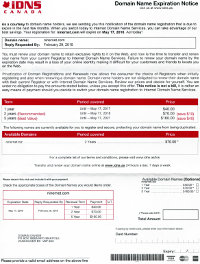Looking very much like the “invoices” sent out years ago by the heavily-fined (and, at various times, suspended by both ICANN and CIRA) so-called Domain Registry of Canada (also known as Internet Registry of Canada, Domain Registry of America, Domain Registry of Europe, NameJuice.com, Brandon Gray Internet Services Inc. and many more), the “not a bill” “domain name expiration notice” received by NinerNet Communications recently reminds us that some people only know how to do business dishonestly — or at the very least on the fringes of legality.
Although it could have been copied, the notice received by us from “iDNS Canada” is almost identical to those of the Domain Registry of America sent out in previous years, and the maple leaf used in the iDNS Canada logo is indeed identical to that used by the Domain Registry of Canada in previous notices.
Let’s analyse a few aspects of this friendly and helpful “domain name expiration notice”:
- Their website domain on their notice is idns.as, the dot-as country-code top-level domain (ccTLD) being registered to American Samoa, a south Pacific island nation. Trying to load the website at that address results in a redirection to idns.to, the dot-to ccTLD being registered to Tonga, another south Pacific island nation. I suspect they didn’t register a dot-ca domain because they’re not flavour of the month down at CIRA headquarters (assuming a connection, which is not much of a stretch), and might have had their domain suspended in short order had they registered a dot-ca.
- The footer of their website claims that they are “Internet Domain Name Services Inc.” — a name also used on the return envelope in which you’re supposed to send your cheque (or credit card number) and payment stub. Their contact page (when loaded from a computer in Canada) offers the same box number address in Toronto, Ontario, Canada that is on their notice (delivered to our Canadian address; more on that in a moment), which is located in Bridlewood Mall, where there is a Canada Post outlet hosted by Shoppers Drug Mart offering post office boxes.
- If you load their contact page from a computer located in the United States (or the United Kingdom, actually), the contact page offers a suite number address at 924 Bergen Avenue in Jersey City, New Jersey, United States of America. A quick check shows this to be a UPS Store, so the “suite number” is also actually a mail box number.
- On their contact page is an email address on the idnsinc.net domain, which is registered to the same company at the same box number in Jersey City in the US.
There are three notable things about this notice:
- First of all, the notice refers to ninernet.com, a secondary domain that we use but which is registered to our US address. However, it was sent to our primary Canadian address, which is also on the same contact page on our website as our US and Zambian addresses.
- As with the almost identical Domain Registry of Canada and Domain Registry of America phoney invoices, the “notice” from iDNS Canada makes reference to another “available” domain (in this case ninernet.BIZ) and invites us to send in payment to register it. However, ninernet.biz is not available; it has been registered by us since 2010. There is no indication on the notice what would happen to this extra money if we decided to send it in to register this additional unavailable domain.
- Finally, while similar such “notices” in the past have included fine print that authorises the sender to transfer the registration of the domain from under the management of the existing registrar to management by the sender of the so-called solicitation (a process referred to as “domain slamming“), this one doesn’t include any such fine print. In fact, there isn’t even any indication on the “notice” that sending money to iDNS Canada (aka Internet Domain Name Services Inc.) will obligate them to do anything, as they have no way to renew a domain that is not under their control!
So don’t send them money, as you’re almost certainly sending money into a black hole from which you will likely see no service and from which you will probably be unable to retrieve it!
As always, if you receive any kind of communication from a third-party (with whom you don’t already have an established and trusted relationship) about your domain — via postal mail, email, telephone, fax or even smoke signal — be suspicious, be wary. If you’re not sure whether or not it is legitimate, please contact us about it and we will be more than happy to take a look and advise you whether or not it is legitimate.
